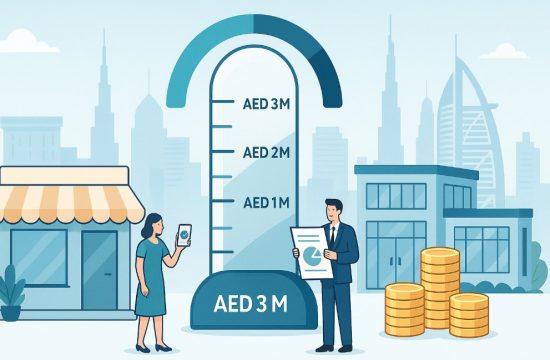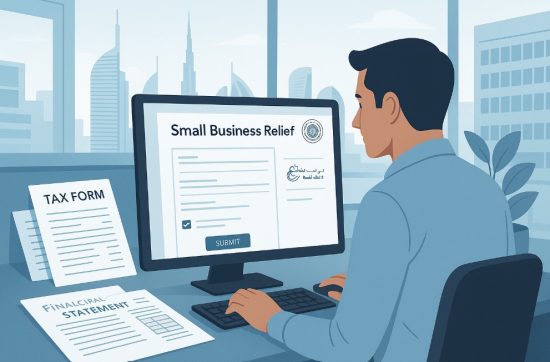
Are you a small business owner in the UAE wondering how the new corporate tax regulations affect you? You’re not alone. Since the UAE introduced its new corporate tax regime on June 1, 2023, many entrepreneurs have been trying to understand whether they qualify for exemptions or reliefs.
To support small enterprises, the Ministry of Finance announced the Small Business Relief initiative, allowing eligible businesses to reduce their corporate tax burdens.
This guide is designed to walk you through everything you need to know about this strategic relief, from eligibility and benefits to compliance and misconceptions. With the right information, you can take control of your finances and make smart, tax-savvy decisions for your business’s future.
What Is Small Business Relief Under UAE Corporate Tax?

Small Business Relief is a pivotal part of Article 21 of the Federal Decree-Law No. 47 of 2022, offering targeted tax relief to small enterprises in the UAE. The initiative aims to reduce the administrative and financial burdens of the new corporate tax regime for smaller companies.
If your business qualifies, you won’t need to calculate taxable income or pay corporate tax for the relevant period. However, you must still file your corporate tax return and meet the documentation requirements to remain compliant.
This relief does not exempt you from corporate tax indefinitely, but provides a temporary cushion to help you adapt to the new system.
Eligibility is based primarily on your revenue, which must not exceed AED 3 million in the relevant tax period and in all tax periods ending on or before December 31, 2026. It’s a form of simplification rather than full exemption, aiming to ease your transition into the UAE’s evolving corporate tax framework.
Who Qualifies for Small Business Relief in the UAE?
If you’re wondering whether you qualify for Small Business Relief, here are the official criteria to assess your eligibility:
- Revenue Threshold: Your annual business revenue must not exceed AED 3 million.
- Resident Status: You must be a UAE resident business, either as a natural or juridical person.
- Tax Period Compliance: The AED 3 million revenue cap must be maintained in all previous periods up to 2026.
- Corporate Tax Registration: You need to have a valid Tax Registration Number (TRN).
Additional Requirements:
- You must submit an official notification during the tax period when you intend to claim relief.
- You must maintain accurate records proving your eligibility.
- You cannot be part of a Multinational Enterprise Group (MNE) or a Qualifying Free Zone Person.
Failure to meet any of these criteria will make your business ineligible, even if other conditions are met.
How Does the AED 3 Million Revenue Threshold Work?

The AED 3 million revenue threshold is the cornerstone of the Small Business Relief initiative. This threshold isn’t based on taxable income but on gross revenue.
If your business generates AED 3 million or less in revenue for the relevant tax year and in all previous applicable tax years, you qualify for the relief.
Importantly, the AED 3 million cap applies to total revenue, including all income from sales, services, and operations. This figure is not adjusted for expenses or deductions.
The threshold is set to remain in effect until tax periods ending on or before December 31, 2026, giving businesses a clear timeframe to plan ahead.
Should your business revenue exceed the AED 3 million limit in any tax period, you become ineligible for the relief starting from that tax period. This disqualification is automatic and cannot be reversed by dropping revenue in subsequent years. Hence, consistent monitoring of revenue is essential for compliance.
What Are the Benefits of Small Business Relief for You?
Claiming Small Business Relief comes with multiple advantages that make a significant impact on your business’s operational efficiency and financial planning.
- Zero Corporate Tax: You don’t pay corporate tax if your revenue is within the set threshold.
- Simplified Tax Filing: No need to calculate taxable income, simplified returns reduce compliance pressure.
- Cash Flow Boost: More retained income means better investment in growth and staff.
- Operational Flexibility: Use cash accounting, avoiding complex accrual-based systems.
Additional Advantages:
- Fewer record-keeping demands compared to standard corporate tax filers.
- You can focus on growing your business rather than managing tax calculations.
- Helps startups and micro-businesses sustain in early growth phases.
These benefits collectively create a more nurturing environment for small businesses and promote entrepreneurship within the UAE.
How Do You Apply for Small Business Relief?

The process to apply for Small Business Relief is straightforward, but it must be done correctly to ensure eligibility.
Here’s how you can apply:
- Corporate Tax Registration: First, register with the FTA and obtain a Tax Registration Number (TRN).
- File the Tax Return: Submit your corporate tax return even if claiming relief.
- Elect the Relief: Indicate your intent to claim Small Business Relief within the return for the applicable tax period.
- Document Retention: Maintain all records proving your eligibility, including revenue reports and transactional documents.
Tips for Application:
- File early to avoid last-minute complications.
- Use accounting software like TallyPrime or platforms like Alaan for organized financial records.
- Seek guidance from a certified tax consultant if unsure about eligibility or calculations.
Can You Opt Out of Small Business Relief?
Yes, your business can choose not to apply for Small Business Relief even if you qualify for it. There are strategic reasons why some businesses might opt out voluntarily.
For instance, if your company is expecting to grow rapidly or intends to carry forward tax losses for future tax periods, remaining within the standard corporate tax framework may be beneficial.
Opting out also allows you to be part of tax groups and claim other deductions and reliefs unavailable under Small Business Relief. The decision to opt out must be reflected in your corporate tax return for the applicable period.
Once submitted, this decision is irreversible for that period. Businesses are advised to consult tax advisors before making this choice to ensure it aligns with long-term financial goals and expansion strategies.
What If You Don’t Meet the Requirements in Future Years?
Losing eligibility in future tax years is a realistic possibility if your business grows or undergoes restructuring. Here’s how that transition is managed:
- Your business will be treated as a standard taxable entity from the tax period in which the AED 3 million threshold is exceeded.
- Corporate tax will apply to your profits above the exempted threshold of AED 375,000 at a 9% rate.
- You will need to calculate taxable income using accrual accounting instead of the cash basis.
Key Considerations:
- Start preparing for full compliance early if nearing the threshold.
- Track financials regularly to foresee revenue fluctuations.
- Plan tax filings, deductions, and profit reinvestment strategically to minimize liabilities.
Proactive planning ensures a smooth transition out of the relief program without facing non-compliance penalties or cash flow disruptions.
How Is Income Calculated Under This Relief?

When using Small Business Relief, you are not required to compute taxable income in the traditional sense. The relief is granted based on revenue, not on profit margins or net earnings. However, businesses still need to track and report revenue correctly.
The accounting method used under this relief is typically the cash basis, which recognizes income when received and expenses when paid. This approach is simpler and aligns better with how small businesses operate.
That said, even under relief, accurate financial statements and documentation are crucial. The FTA may audit your records to verify eligibility, and if discrepancies are found, relief can be revoked retroactively with penalties applied. Therefore, invest in reliable financial management systems to ensure compliance.
What Are the Common Misconceptions About Small Business Relief?
Despite its clear guidelines, several misconceptions about Small Business Relief persist, often leading to confusion or mistakes in application.
Common Myths Include:
- All small businesses qualify: Not true. You must meet strict eligibility requirements, including the AED 3 million revenue cap.
- Free Zone companies are automatically eligible: Incorrect. Qualified Free Zone Persons are excluded as they already benefit from 0% tax on qualifying income.
- Once eligible, always eligible: No. Eligibility must be reassessed each tax period, and crossing the revenue cap disqualifies you moving forward.
Additional Misunderstandings:
- Relief equals zero compliance: You still need to register, file tax returns, and maintain documentation.
- Artificially splitting businesses helps stay under the threshold: Such practices are considered tax avoidance and can lead to severe penalties.
- VAT registration is not required: VAT compliance remains entirely separate and unaffected by Small Business Relief.
Avoiding these misconceptions is vital to staying compliant and benefiting from the program correctly.
How Can You Stay Updated and Compliant?

Keeping up with regulatory changes is essential to avoid penalties and maintain relief eligibility. The UAE’s corporate tax system is still evolving, and new directives may emerge that impact your compliance obligations.
The best approach is to monitor updates from the Federal Tax Authority and the Ministry of Finance. Regularly visiting their websites ensures you’re aware of new deadlines, changes in eligibility, and updates to filing procedures.
Consulting with a licensed tax advisor or using certified platforms like Alaan and TallyPrime can also help manage your records and tax filings efficiently.
Automation tools reduce human error and provide real-time visibility into your business’s financial health. Remember, relief doesn’t mean zero responsibility, it just makes the path more manageable if you stay informed and organized.
Conclusion
Small Business Relief offers an incredible opportunity for eligible enterprises to reduce tax burdens and focus on growth. However, it’s not a one-size-fits-all solution.
The decision to claim relief should be based on your current revenue, future projections, and strategic financial goals. While it eases compliance and boosts cash flow, it also excludes access to other corporate tax benefits and deductions.
If you meet the criteria, claiming this relief can simplify your operations and improve your financial efficiency. But if you foresee rapid expansion or want to leverage corporate tax incentives, opting out may better suit your goals. The key lies in informed decision-making, thorough planning, and ongoing compliance.
FAQs
Is small business relief available to Free Zone companies in UAE?
No, Qualifying Free Zone Persons are not eligible as they already benefit from a 0% corporate tax on qualifying income.
What is the corporate tax rate if I exceed AED 3 million?
Once your revenue surpasses AED 3 million, you must pay 9% corporate tax on taxable income above AED 375,000.
Can I re-apply for small business relief after opting out?
Yes, but only if your revenue again falls below AED 3 million and you meet all other conditions in future tax periods.
Does small business relief apply to foreign-owned entities?
Yes, if the entity is controlled and managed from within the UAE and meets all other eligibility criteria.
How does small business relief impact VAT registration?
It doesn’t. VAT compliance remains mandatory if your turnover meets the VAT registration threshold.
Will applying for relief trigger an audit by the FTA?
Not necessarily, but your financial records must be accurate, as the FTA may review them for compliance checks.
What penalties exist for misusing the small business relief?
Penalties can include repayment of owed taxes, fines, and potential legal action for tax avoidance practices.



